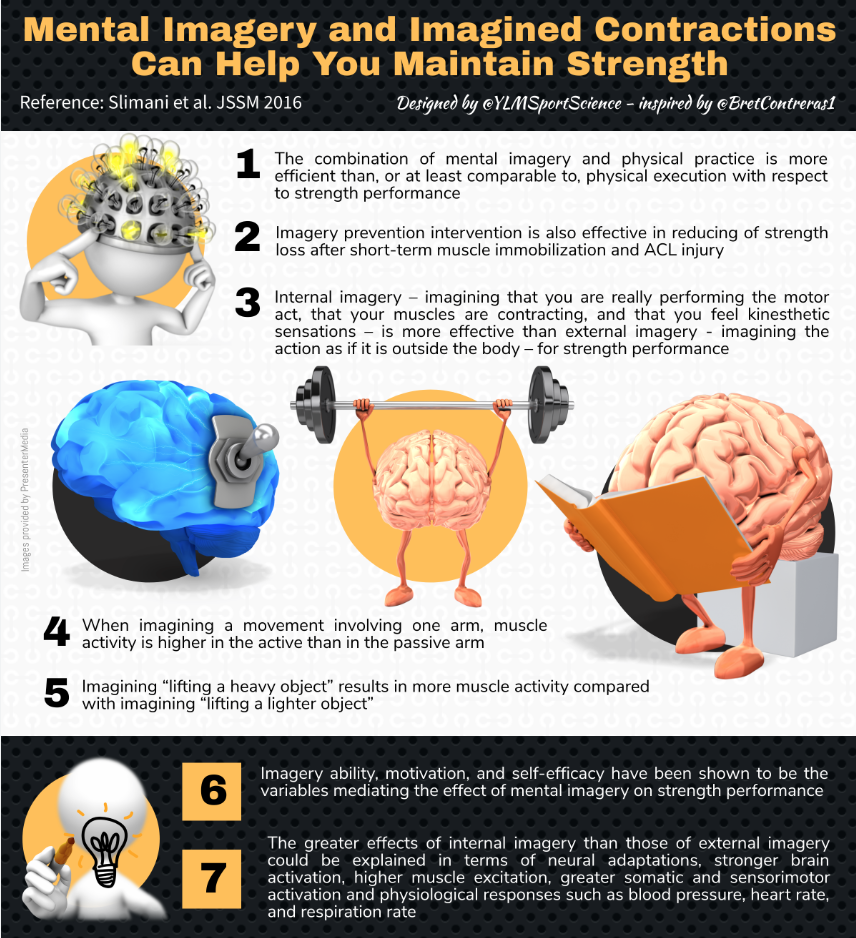It's All In Your Head! Mental Imagery Tips & Techniques To Improve Your Mental Game

It's all in your head. Mental imagery in a nut shell. Tired of being told to get your head in the game?
It's all about being comfortable about the situation you're in and that's what this mental skill can help you accomplish.
We can all remember those special moments on the pitch where we felt like we were in the zone and could do no wrong, imagery is drawing on those experiences and creating positive moments in our head before they even happen to help us perform at our highest possible level.
Studies have shown that the mind can't tell the difference between imaging the moments in your head and actually performing them, what an amazing way to get some more reps in and raise your game from the inside out.
It should be no surprise seeing that every professional team at the highest level has several mental performance coaches to help players with their confidence by implementing a wide range of mental training skills, this one being at the top of that list.
If you want a very simple routine of doing some mental imagery yourself before a game or training I've included it below so you can start getting after it right away.
Mental Imagery & Visualization Explanation Video
What Is Mental Imagery Exactly? Does It Really Work?

Mental imagery (or visualization) is imagining yourself going through a set of actions in your head to help the execution of these actions before you actually perform them.
Using all your senses (sight, touch, smell and hearing) you are to create a life like event to help you feel more confident and competent at carrying out the action.
Think about sitting quietly somewhere, closing your eyes and just replaying past positive actions you've had and start to see yourself doing those actions in a future game. There have been several studies and testimonials from world class athletes talking about the effectiveness of mental imagery.
My favourite one was from an Olympic swimmer who said winning the gold medal at the summer olympics wasn't that great of a moment or surprise to them because it felt like they had been there a thousand times because of all the times they sat down and imagined it happening before it did.
The power of mental imagery can vary from person to person but is definitely a tool you want to try and develop to help yourself calm down, ramp up or raise your confidence before any match or training.
How Do I Go About Doing A Mental Imagery Routine Before A Game?
Okay let's walk through a mental imagery session that I've done in the past nice and easy. First find a quiet spot where there aren't too many distractions around you like under a tree, park bench, in your car, whatever.
You can listen to some light music if you like but not necessary, your own personal preference really. Start slowly thinking about some performances in the past month or year that you remember scoring a goal, making a great save, great pass or anything else where you felt completely zoned in.
As you think of all those memories start imagining those same great actions along with new ones on the new pitch you'll be playing on. As you start to formulate these in your mind begin to engage all of your senses, for hearing think about the noises of the other players, coaches, spectators and officials may be making as this great moment is happening.
After that start seeing it happen along with the noises, every cut, pass, shot and sprint you make as you play at the highest level you possibly can.
Then try and think deeply about all the smells that are happening during this time, how the grass or turf smells, the smell in the air, the smell of sweat or anything else to really make it as realistic as possible. Finally add the sensation of feel to your imagery, how do your feet feel running across the pitch, your body as it collides with others and the wind and sun across your face.
As you can see really deeply imagining how you're going to play is a very intentional process that takes time to develop but can have incredible lasting effects.
There are probably very few of your teammates doing such mental work so this is your chance to really separate yourself from the pack. If you or your friends don't believe you show them this article on all the different high level athletes using mental imagery to perform at the Olympics and other professional settings. Mental Imagery and Visualization in Sports.
How Long Should I be Doing It For?
Can I listen To Music While Doing It?
The goal here should be to slowly get better at it not necessarily trying to do it for a specific amount of time. You will find as you practice it more (like anything) it will become easier and easier to quickly recall past performances and use them to start creating the positive thoughts that will help you in the game ahead.
As for music you can absolutely listen to some music while you do this if it helps stimulate your mind and gets you in a positive state. I've found putting light calming music or pump up music really depends on your type of personality and what gets you pumped to play.
Top 5 Things To Remember About Mental Imagery

1. Involve Your Senses
- Remember just thinking about how you're going to play great is the first step, really go deep into what you will see, hear, feel and touch while performing on the pitch.
2. It Takes Time
- Learning to shoot with your left foot doesn't happen overnight so don't expect the practice of valuable mental imagery will happen at the snap of your fingers either.
3. Separating Yourself From The Pack
- When we talk about doing little things to improve your game that most aren't this is one great example.
- How many of your friends or teammates are working on their mental game the same way professionals do? This is a game changer, add it to your tool belt.
4. Consistency
- You can't do this once a month and wonder why you aren't playing well.
- Just a few minutes a day before training or games will make a big impact only if it is done consistently.
- Keep chipping away at the rock even if it is in short periods every day.
5. Just The Beginning
- Remember that this is just the beginning of your mental improvement journey.
- Writing letters to yourself, affirmations and many more skills will start to be added to your game so work on this one but know there is even more great things to come.
Top 3 Things To Avoid About Mental Imagery
1. Giving Up
- There will be times like in anything we do in this game where we aren't seeing the results and want to give up.
- This is a completely normal feeling int he learning process, you've got to push through that and continue to bang away at it as the results will come if you put the work in.
2. Rushing It
- Zipping through it in 10 seconds and not giving it your full focus and attention is just wasting your own time.
- If you're going to do it then take the time and really put the thought and desire into it necessary to be great at it.
3. Listening To Others
- People around you may try and tear you down or make fun of you for doing this, let them.
- There is no shame in trying to get better, those people that poke fun are just mad they don't have the same type of desire, commitment and passion that you do.
Internal Imagery
Picking apart every detail night after night made me truly believe that I was a special player. You can do it too, there are generally two ways to recreate these moments in your mind, an internal view and an external view.
Internal Imagery
So, the way to truly take full advantage of this tool is to take 15 minutes before bed (that's all it really takes) and picture yourself on the pitch through your own eyes. What's important here is to look at it as if you are in that exact moment again and seeing the game again just as you do when you are playing. Every last detail from the beginning to the end of the match highlighting the positive moments of you on the pitch.
Think and really recreate:
- Every little voice and sound from the actual moment.
- Positive movements, passes, shots, dribbles and play, rewind and play them over and over in your mind as if rewinding and playing a section of a movie over and over again.
- How the field and your surroundings smelt (yes i'm serious).
- Think about how you felt before, during and after that brilliant moment.
- This is important, that same exact feeling of confidence and positive energy you want to replay over and over again to recreate that every time you step foot on a field.
External Imagery
Slightly different from internal (looking at it through your own perspective). External imagery focuses on looking it as a fan does the game or birds eye view if you will. This allows you to step back and see the bigger picture. Allowing you to recreate in your mind from an outsiders view point.
This allows you to recreate with amazing accuracy what not only happened in your direct interaction with the game but also your immediate surroundings. Sometimes stepping back gives you a closer look.
Again remember to pick up on details such as:
- How you felt in that exact moment (hot, cold, tired, fresh, itching for a goal etc).
- What you could literally feel (ball on your foot, opponent, teammate, grass etc).
- What people were saying to you, teammates, opponents and fans.
- Your exact thought process to the best of your recollection. "I'm gonna burn this guy, I'm gonna stick this guy, man I feel good, I'm killing these guys all match long" etc.
The beauty of these two mental imagery tools are they are simple to practice and pay dividends in the demanding mental aspect of any competitive fixture.
Story Time
I once read a story about an Olympic swimmer who used imagery every single day and imagined herself performing at the Olympics, having the race of her life and ultimately winning gold.
She imagined everything from the preparation of the race to hearing her countries anthem played as she stood on the podium. When asked about it she said that she had felt like she had done it a million times and been there before. But how?
Every single day in the morning and night before bed she imagined the entire process through mental imagery. So by the time she got there she felt like she was just going through the motions she had gone through hundreds of times before that.
She felt comfortable and relaxed and the moment didn’t get to her because of her mental practice over the years and you can do it too! It took me lots of time to really appreciate and understand the effect of what mental imagery can do for your game.
It's about staying disciplined and constantly having these moments recreated from every last detail to have another confidence building resource. Even Ronaldinho had confidence issues, it happens to us all.
Slowly add these mental imagery tools to your arsenal and you'll be feeling more confident and get that "wow i've been here before" feeling even in the most stress filled moments. All that's left now is to help you with those boots of yours, really? Anybody who said neon was flattering lied.
Have A Great Story or Tip About This Topic?
Do you have a great story about this? Share it!
Return from Mental Imagery Page to Soccer Tips Page
Return from Mental Imagery Page to Soccer Training Methods Homepage






